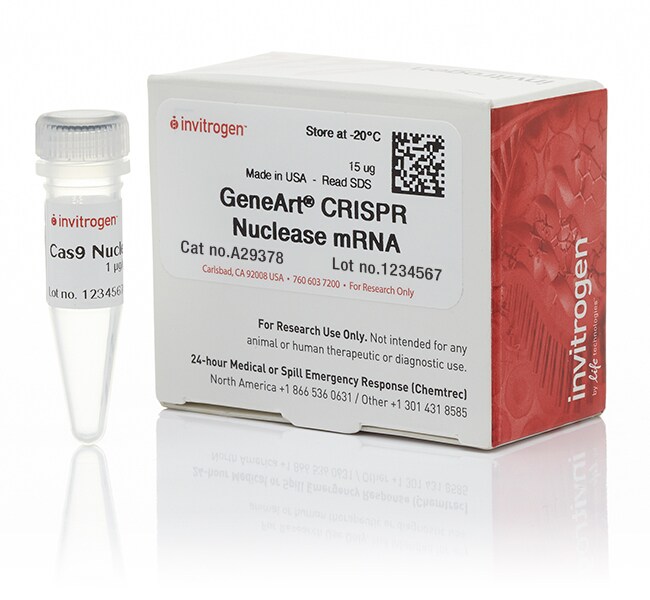
GeneArt™ CRISPR Nuclease mRNA is formulated using a new manufacturing process to achieve superior quality and improved product performance. This wild-type Cas9 mRNA has two nuclear localization signals (NLSs). Cas9 constructs with two NLSs have been shown to be more efficient at targeting the Cas9 protein to the nucleus (1). The mRNA format is ready to transfect and circumvents the need for time-consuming cloning steps required when using CRISPR vector systems. Cas9 mRNA is co-transfected with a target-specific guide RNA (gRNA) to direct the Cas9 protein to the intended genome locus to create a double-stranded break. The complete RNA format is a smaller payload than plasmid-based Cas9 systems for improved delivery into the cell and better genome editing efficiency. Additionally, the Cas9 mRNA can be used in multiplex approaches with more than one gRNA. Use this approach to determine which gRNA sequence works best for a particular target or to edit multiple genomic loci with one transfection.
How to obtain a gRNA sequence
Genome editing with CRISPR technology requires a noncoding guide RNA (gRNA) in order to cleave genomic DNA at a target sequence of interest. The gRNA has two molecular components: a target-specific CRISPR RNA (crRNA) and a trans-activating crRNA (tracrRNA) that have been combined into one transcript. The target sequence (20 bases) must be immediately upstream of a PAM motif (NGG) which allows the Cas9 to initiate binding. The PAM is only on the target DNA and not part of the target specific CRISPR sequence. The gRNA and the PAM motif guide the Cas9 nuclease to the target genomic sequence to form a complex and create a double-stranded blunt DNA break (DSB) three nucleotides upstream from the PAM site.
Use our GeneArt CRISPR Search and Design Tool to search our database of >600,000 gRNA sequences specific to every gene in the human and mouse genomes. GeneArt predesigned gRNAs are optimized for gene knockout and typically target the first three transcribed exons per gene. Search results include recommendations based on minimizing potential off-target effects, potential binding sites, and exon maps with gRNA locations. This tool can also be used to analyze any sequence of interest to design unique CRISPR sequences.
How to make gRNA
Once gRNA sequences have been selected, choose from three options for making gRNA:
1. The GeneArt Precision gRNA Synthesis Kit for transfection-ready gRNA in as little as four hours including template assembly.
2. GeneArt CRISPR Strings, a synthetic DNA template consisting of the gRNA with a T7 promoter for in vitro transcription or U6 promoter for ready-to-transfect format, which may be purchased via the GeneArt CRISPR Search & Design Tool or by completing the GeneArt CRISPR Strings DNA Order Form and submitting it to GeneArtSupport@lifetech.com.
3. Save time and effort and have our GeneArt custom services team design, synthesize, and purify in vitro transcribed (IVT) gRNA sequences for you. To obtain a services quotation, or to order, please contact our Custom Services department at 1-800-955-6288 x45682 or custom.services@lifetech.com.
Resources
Demonstrated protocol: Engineering stem cells with CRISPR-Cas9
References
1.Cong L, Ran FA, Cox D, Lin S, Barretto R, Habib N, Hsu PD, Wu X, Jiang W, Marraffini LA, Zhang F. (2013) Multiplex Genome Engineering Using CRISPR/Cas Systems. Science 339(6121):819-23.
| Code | Description |
|---|---|
| A29378 | Catalog Number: A29378 |

